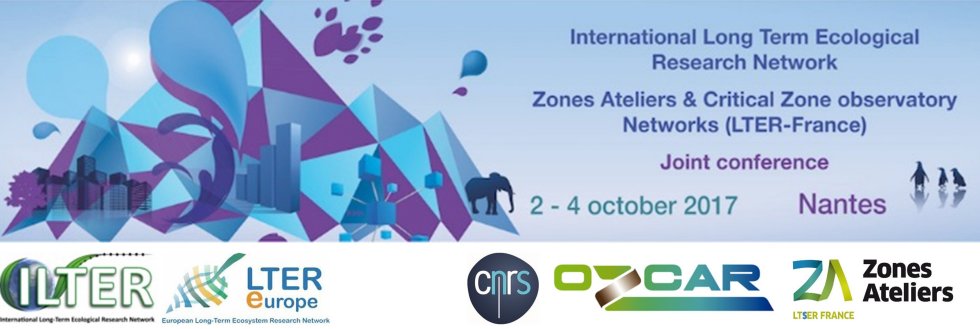
Call for Abstract > Call for CommunicationsYou are welcome to send your abstract to The International Long Term Ecological Research Network & Zones Ateliers Network Joint Conference (ILTER & RZA 2017). You will find on the left side of the page the link to the template file. The following sessions are proposed:
Ecosystem services (Millenium Ecosystem Assessment, 2005 ) are the benefits that human groups derive from ecosystems, and are grouped into four categories: (i) procurement services, such as food or energy, (ii) regulatory services, which include water quality or climate, (iii) Supporting services, such as nutrition cycles and soil formation, and (iv) cultural, aesthetic, recreational or religious services. This session aims to show how the Zones Ateliers and the Critical Zone Observatories focus on these services, the limits of the concepts, and how they could better integrate biodiversity and physico-chemical based approaches. [1] Millennium Ecosystem Assessment, (2005). Ecosystems and Human Well-being: Synthesis, Island Press, Washington DC.
Devastating storms, severe thunderstorms, prolonged heat waves and droughts, submerged waves are among the most well-known environmental risks to the general public due to their impact on societies, not to mention those associated with major technological accidents. On the other hand, other risks are less visible due to their long-term or less dramatic impacts, as well as the difficulty of characterizing and evaluating them. Examples include reduction of water resources, long-term presence of metals and organic micropollutants in aquatic ecosystems, changes in ecosystems and habitats leading to a decrease in biodiversity or the spread of invasive species. This session aims to present the specific contribution of the ZA, CZO and ILTER Observatories to quantifying the risks in their complexity and their different phases (prevention, crisis management ...).
The concept of social-ecological systems is highly integrative, yet challenging to operationalize. To date, development of theory and conceptual frameworks far outpace empirical analyses. The objective of this session is to explore the integration status of social research (broadly speaking) in international LTER, to identify gaps of knowledge and to explore and recommend steps towards greater integration of socio-ecological research and goals into ILTER and French LTER.
The objective of this session is to consider the ability of LTSER research to produce knowledge that can be applied i) to integrate public actors (or public policies) into decision-making, e.g. by identifying pathways that can best integrate the social and biophysical components of a social-ecological system ii) to create novel management opportunities, e.g. by reducing potential conflicts between practices that can arise and iii) to renew and invigorate governance as a key driver of resource allocation and thus of sustainable transitions.
Too much nitrogen in terrestrial and aquatic ecosystems is an environmental challenge that has already exceeded critical loads in many parts of the world. Elevated nitrogen availability leads to biodiversity loss in many ecosystems globally. In addition, excess nitrogen threatens Water, Air, and Soil quality, increases Greenhouse gasses, and alters the relationship between biodiversity and ecosystem functioning. This session aims to discuss how ILTER’s scientific outcomes, on-going projects, database and networks could contribute to the on-going global N assessment projects (i.e., toward INMS projects).
The anthropogenic impact on global biogeochemical cycles is clear for a number of elements and substances. This session aims at showing how long-term monitoring of ecosystems (and of the critical zone) is crucial not only for a better understanding of ecosystem behavior and trajectories but also for identifying key processes and feedbacks between the physical, biological and social system components of the biosphere.
This session is dedicated to the development of, use and potential for environmental sensors and sensor networks, in ZA, ILTER and CZO research programs.
This session is open to any topic that does not fit any of the above proposed sessions. Please download the abstract template given in the website. The abstract submission deadline is July 21, 2017 and you are required to submit your abstract on or before the deadline. The acknowledgement of receipt will be sent to you within 2 to 3 days. Working Language The working language of the conference is English and abstracts must be submitted in English. |

